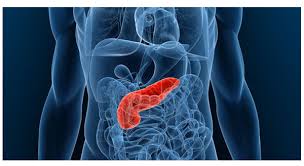- Home
- Editorial
- News
- Practice Guidelines
- Anesthesiology Guidelines
- Cancer Guidelines
- Cardiac Sciences Guidelines
- Critical Care Guidelines
- Dentistry Guidelines
- Dermatology Guidelines
- Diabetes and Endo Guidelines
- Diagnostics Guidelines
- ENT Guidelines
- Featured Practice Guidelines
- Gastroenterology Guidelines
- Geriatrics Guidelines
- Medicine Guidelines
- Nephrology Guidelines
- Neurosciences Guidelines
- Obs and Gynae Guidelines
- Ophthalmology Guidelines
- Orthopaedics Guidelines
- Paediatrics Guidelines
- Psychiatry Guidelines
- Pulmonology Guidelines
- Radiology Guidelines
- Surgery Guidelines
- Urology Guidelines
Short acting Calcium channel blockers linked to pancreatic cancer

Pancreatic cancer occurs among older individuals who also have chronic comorbid medical conditions, such as hypertension. Antihypertensive medication use has increased significantly among these individuals.Zhensheng Wang presented findings of a study at American Association for Cancer Research Annual Meeting short-acting which infers that Calcium channel blockers are associated with increased risk for pancreatic cancer among postmenopausal women.
The researchers used data from the Women’s Health Initiative to assess how antihypertensive drugs and the soluble receptor for advanced glycation end product (sRAGE) may affect pancreatic cancer risk.They collected data on medication usage from 145,551 postmenopausal women aged 50 to 79 years who were enrolled from 1993 to 1998 and did not have prevalent cancer at baseline. The investigators assessed four types of antihypertensive drugs: beta blockers, diuretics, angiotensin-converting enzyme inhibitors and calcium channel blockers.Mean follow-up was 13.8 years.By August 2014, researchers observed 841 cases of pancreatic cancer.Compared with ever-users of other types of antihypertensive medications, users of short-acting CCBs had a hazard ratio (HR) for development of pancreatic cancer of 1.66, which was significant after adjustment for a number of relevant factors
After adjustment for comorbid factors, women who had ever used short-acting calcium channel blockers (n = 14,105) demonstrated a 66% higher risk for pancreatic cancer (HR = 1.66; 95% CI) compared with those who had ever used other antihypertensive drugs.Those who used calcium channel blockers for more than 3 years demonstrated a 107% higher risk than those who had ever used other antihypertensive drugs. These association remained significant after investigators accounted for competing risks.
sRAGE is thought to slow inflammatory response by blocking pro-inflammatory signaling. The blockage caused by the use of calcium channel blockers may reduce sRAGE release and cause chronic inflammation, a known risk factor for pancreatic cancer and other cancer types.
Among a smaller cohort of patients for whom serum sRAGE levels were available, there were lower levels seen in those taking short-acting CCBs compared with any other type of antihypertensive medication (P = .032).
The other studied antihypertensive medications, including long-acting calcium channel blockers, did not appear associated with increased risk for pancreatic cancer.The limitations of the study included its observational nature, the inclusion of only postmenopausal women but no men or younger women, and so further investigation is needed to elucidate the potential risks.

Disclaimer: This site is primarily intended for healthcare professionals. Any content/information on this website does not replace the advice of medical and/or health professionals and should not be construed as medical/diagnostic advice/endorsement or prescription. Use of this site is subject to our terms of use, privacy policy, advertisement policy. © 2020 Minerva Medical Treatment Pvt Ltd